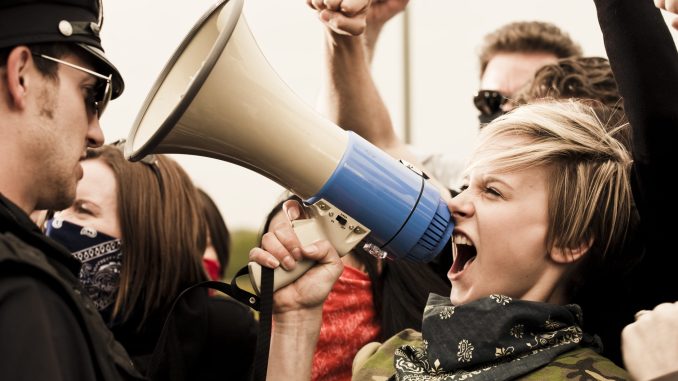
The protests popping up throughout college campuses are sparking debate as to how far administrators should go in protecting their students while balancing free speech.
Interestingly, the tables are somewhat turned as leftists who had violently and loudly pushed to ban conservative speakers from college campuses (because their words were somehow construed as violence) are now seeking to protect their violent behavior by claiming they are protected by the First Amendment. Conversely, we see many on the right seeking to censor protests that range from calling for a killing of the Jews to simply opposing Israeli policies.
Striking the right balance is essential to preserving our safety and our democracy.
We must start with the premise that free speech is what sets America apart from all of the countries in the history of civilization. We are so adamant in the protection of our First Amendment that we even protect hate speech. Advocates on both the right and left get it wrong when they say hate speech is, or should be, illegal.
One of the top five most important cases in American history was the Skokie Affair in 1977, wherein the Supreme Court held that a group, even as noxious as the National Socialist Party of America, had a constitutional right to march down Main Street, so long as they are not carrying out or preaching violence.
Many rational-minded Americans were outraged, but it was absolutely the correct decision. Striking down the rights of the Nazis to march would one day reverberate back on those on the other side of the political spectrum who might hold an unpopular minority opinion.
But these freedoms have been eroded over the last decade as Critical Race Theory (CRT) and Diversity, Equity and Inclusion (DEI) dogma have permeated college campuses, flipping logic so that offensive speech uttered by the right is now deemed to be violence, while violence perpetrated by the left is now deemed to be protected speech.
This is wrong, both morally and legally.
That’s why it’s so important that those of us who despise the hateful rhetoric from the pro-Hamas crowd do not go overboard and start banning their odious speech.
So let’s dissect what should be proper and what is out of bounds:
- Calling other people bad names is not a crime.
- Holding or espousing toxic political views is not a crime.
- Being anti-Israel, or even antisemitic, is not a crime.
- Shouting antisemitic slogans is not a crime.
Chanting “Palestine will be free, from the river to the sea” may be an odious call for the elimination of the state of Israel, but it is not a crime, and should not be subject to censorship. On the other hand, saying we should “kill the Jews” certainly is.
The two are not the same.
Pro-Hamas protesters calling Joe Biden a supporter of genocide, or even denying the atrocities committed by Hamas, is within the bounds of the First Amendment. Striking a Jewish protester over the head with a bullhorn is not. Nor is seeking to break into a library to assault Jewish students, or chasing down and cornering a teacher who dared to attend a pro-Israel event. Nor is surrounding a Jewish student and prohibiting his movement.
A student who joins a protest and stupidly claims that Israel had it coming is not in violation of the law, and should not be sanctioned by the university. But a student who seeks to deny a Jewish student to speak his own mind or to walk freely, or seeks to exact physical harm on another student, should be expelled.
For too long, college administrators have looked the other way as radical leftists unconstitutionally and illegally denied the rights of conservatives to speak on campus. In fact, some, such as the individual who led the charge to stop a conservative law professor from speaking at a California university, have actually been rewarded by being given a position on a board to select the next college dean. What kind of message is this sending to our future leaders?
Administrators have given a free pass to leftist campus agitators who have quashed the free speech of those with whom they disagree. Had they been disciplined when appropriate, campus leaders could have sent a message that you can say whatever you want, so long as you are not physically hurting others or stifling their speech. But once they sanctioned the suppression of speech from conservatives, they opened the door for the right to do the same to leftist provocateurs.
We shouldn’t fall into that trap. Let’s be consistent. Say whatever you want, but don’t hamper the other side from doing the same or advocate for physical harm of others.

